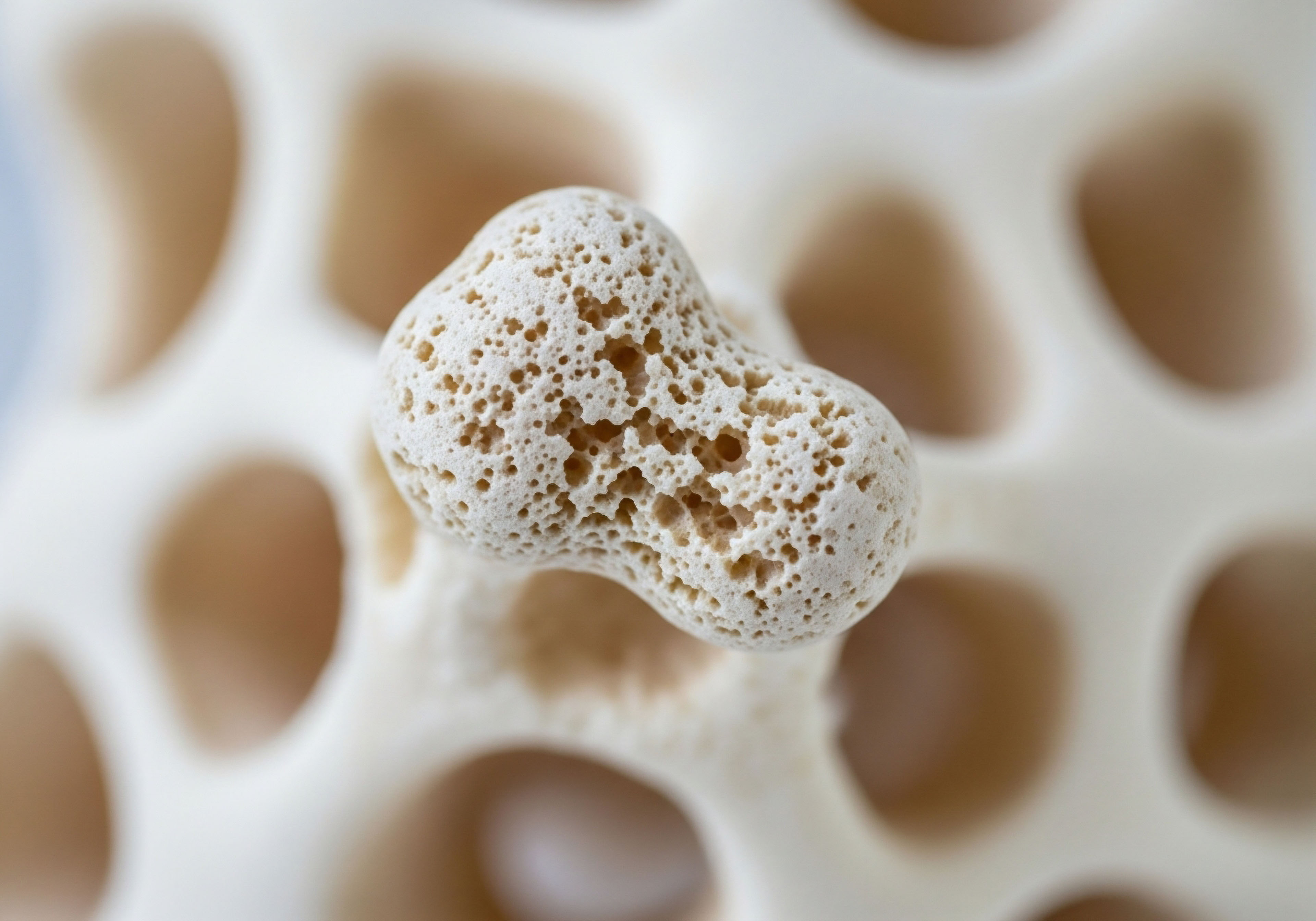

Fundamentals
Many individuals experience a subtle yet persistent shift in their daily experience, a quiet diminishment of the mental sharpness and vitality that once felt innate. Perhaps you notice a lingering brain fog, a diminished capacity for focus, or a general sense of mental fatigue that seems to defy simple explanations.
This feeling of being slightly off, of not quite operating at full capacity, is a deeply personal concern, often dismissed as a normal part of aging or daily stress. Yet, these sensations are often signals from your body’s intricate internal communication network, particularly its hormonal systems. Understanding these signals, and how they relate to your brain’s well-being, represents a significant step toward reclaiming your cognitive vigor.
Our bodies operate through a complex orchestra of chemical messengers, and among the most influential are hormones. These substances, produced by various glands, travel through the bloodstream, delivering instructions to cells and tissues throughout the body. They regulate nearly every physiological process, from metabolism and mood to sleep patterns and, critically, brain function. When these messengers are out of balance, even subtly, the effects can ripple across your entire system, impacting how you think, feel, and interact with the world.
Hormones serve as vital chemical messengers, orchestrating a vast array of bodily functions, including those essential for optimal brain performance.

The Brain’s Hormonal Landscape
The brain, far from being an isolated command center, is profoundly sensitive to hormonal fluctuations. Specific regions of the brain possess receptors for various hormones, meaning they are designed to receive and respond to these chemical signals. For instance, sex hormones like testosterone and estrogen play a direct role in neuronal health, synaptic plasticity, and neurotransmitter synthesis. They influence memory consolidation, emotional regulation, and even neurogenesis, the creation of new brain cells.
Beyond the sex hormones, other endocrine system components exert considerable influence. Thyroid hormones are fundamental for brain development and metabolic activity within neural tissues. An underactive thyroid can manifest as cognitive slowing, memory issues, and a general lack of mental energy. Similarly, hormones involved in stress response, such as cortisol, when chronically elevated, can impair hippocampal function, a brain region critical for memory and learning.

Lifestyle as a Biological Modulator
The concept of lifestyle factors influencing hormonal efficacy for brain health might seem abstract, yet it is deeply rooted in physiological reality. Your daily habits are not merely external choices; they are powerful biological modulators. Consider your diet ∞ the nutrients you consume provide the building blocks for hormone synthesis and the energy for cellular processes.
The quality of your sleep directly impacts the pulsatile release of growth hormone and the regulation of stress hormones. Physical activity influences insulin sensitivity and blood flow to the brain, both of which are intimately connected to hormonal signaling.
These lifestyle elements do not simply exist alongside hormonal interventions; they interact with them, shaping their effectiveness. Imagine a finely tuned instrument ∞ even the most skilled musician will struggle to produce harmonious sounds if the instrument itself is out of tune. Similarly, hormonal optimization protocols, while powerful, operate within the context of your body’s overall physiological state.
A body that is well-nourished, adequately rested, and regularly active provides a more receptive environment for these interventions, allowing them to exert their intended effects more fully.

The Interplay of Systems
The body functions as an interconnected system, where no single component operates in isolation. The endocrine system, the nervous system, and the immune system are in constant communication, forming complex feedback loops. For example, chronic stress, a lifestyle factor, activates the hypothalamic-pituitary-adrenal (HPA) axis, leading to sustained cortisol release.
This sustained elevation can disrupt the delicate balance of sex hormones and thyroid hormones, indirectly impacting brain function. Conversely, regular physical activity can improve insulin sensitivity, which in turn supports healthy hormonal signaling and neuroprotection.
Understanding this intricate web of connections is the first step toward a more holistic approach to brain health. It moves beyond simply addressing symptoms in isolation and instead seeks to optimize the underlying biological terrain. This foundational knowledge empowers you to view your daily choices not as minor details, but as significant contributors to your overall hormonal balance and cognitive vitality.


Intermediate
When considering hormonal interventions for cognitive well-being, the conversation naturally progresses beyond basic understanding to the specific protocols and their interaction with daily living. Hormonal optimization is not a standalone treatment; it is a recalibration process that works synergistically with a supportive physiological environment.
The effectiveness of targeted hormonal therapies, such as Testosterone Replacement Therapy (TRT) or Growth Hormone Peptide Therapy, is significantly influenced by the lifestyle choices an individual makes. These choices can either enhance the body’s receptivity to the intervention or create obstacles to its full benefit.

Testosterone Optimization Protocols
Testosterone, often associated primarily with male health, plays a critical role in both men and women, particularly concerning brain function. For men experiencing symptoms of low testosterone, such as diminished mental clarity, reduced motivation, and cognitive slowing, TRT protocols aim to restore physiological levels. A standard approach involves weekly intramuscular injections of Testosterone Cypionate, typically at a concentration of 200mg/ml. To manage potential side effects and maintain endogenous production, this is often combined with other agents.
- Gonadorelin ∞ Administered via subcutaneous injections, often twice weekly, to stimulate the natural production of testosterone and preserve testicular function and fertility.
- Anastrozole ∞ An oral tablet, typically taken twice weekly, to inhibit the conversion of testosterone to estrogen, thereby mitigating estrogen-related side effects like fluid retention or gynecomastia.
- Enclomiphene ∞ This medication may be included to support the levels of Luteinizing Hormone (LH) and Follicle-Stimulating Hormone (FSH), further encouraging the body’s own hormonal signaling pathways.
For women, testosterone optimization addresses symptoms like irregular cycles, mood changes, hot flashes, and reduced cognitive sharpness. Protocols for women are tailored to their unique physiology and menopausal status. Weekly subcutaneous injections of Testosterone Cypionate, typically at a lower dose of 10 ∞ 20 units (0.1 ∞ 0.2ml), are common.
Progesterone is often prescribed alongside, especially for peri-menopausal and post-menopausal women, to support uterine health and hormonal balance. Pellet therapy, offering long-acting testosterone release, can also be an option, with Anastrozole considered when appropriate to manage estrogen levels.
Optimizing hormonal balance through targeted interventions requires a comprehensive approach that considers individual physiological needs and integrates supportive lifestyle practices.

How Lifestyle Shapes Hormonal Efficacy?
The efficacy of these precise hormonal interventions is not solely determined by the administered dose; it is profoundly shaped by the body’s internal environment, which is largely a product of lifestyle. Think of your body as a sophisticated communication network. Hormones are the messages, and your cells are the receivers. Lifestyle factors determine the clarity of the signal and the responsiveness of the receivers.

Nutritional Biochemistry and Hormonal Responsiveness
Diet provides the fundamental building blocks for hormone synthesis and the cofactors required for enzymatic reactions that metabolize hormones. A diet rich in whole, unprocessed foods, healthy fats, and adequate protein supports optimal endocrine function. For instance, cholesterol, derived from dietary fats, is a precursor for steroid hormones like testosterone.
Micronutrients such as zinc, magnesium, and Vitamin D are essential for various hormonal pathways, including testosterone production and receptor sensitivity. Conversely, diets high in refined sugars and inflammatory fats can lead to insulin resistance and systemic inflammation, which can impair hormonal signaling and reduce the effectiveness of exogenous hormones.

Sleep Architecture and Endocrine Rhythm
Sleep is not merely a period of rest; it is a critical time for hormonal regulation and repair. The body’s endocrine system operates on a circadian rhythm, with many hormones exhibiting pulsatile release patterns tied to the sleep-wake cycle. Growth hormone, for example, is predominantly released during deep sleep.
Insufficient or disrupted sleep can dysregulate cortisol patterns, impair insulin sensitivity, and negatively impact the production and sensitivity of sex hormones. When an individual undergoing TRT consistently experiences poor sleep, the body’s ability to utilize the administered testosterone effectively, or to maintain the delicate balance of other hormones, can be compromised, potentially diminishing the cognitive benefits sought.

Physical Activity and Metabolic Health
Regular physical activity, particularly resistance training and high-intensity interval training, can significantly improve insulin sensitivity, reduce systemic inflammation, and enhance blood flow. These physiological adaptations create a more favorable environment for hormonal action. Improved insulin sensitivity means cells are more responsive to insulin, which in turn supports metabolic health and reduces the burden on the endocrine system.
Enhanced blood flow ensures that hormones and nutrients reach target tissues, including the brain, more efficiently. For individuals on TRT, consistent exercise can augment the positive effects on body composition and mood, indirectly supporting brain health outcomes.

Stress Management and Neuroendocrine Balance
Chronic psychological stress activates the HPA axis, leading to sustained elevation of cortisol. While cortisol is essential for acute stress response, its chronic elevation can suppress the hypothalamic-pituitary-gonadal (HPG) axis, thereby reducing the body’s natural production of sex hormones. This can create a less responsive environment for exogenous hormonal interventions.
Effective stress management techniques, such as mindfulness, meditation, or spending time in nature, can help modulate the HPA axis, reducing cortisol burden and promoting a more balanced neuroendocrine state, thereby supporting the efficacy of hormonal protocols for brain health.
Consider the Post-TRT or Fertility-Stimulating Protocol for men. This protocol, often including Gonadorelin, Tamoxifen, Clomid, and sometimes Anastrozole, aims to restore natural testosterone production and fertility after TRT cessation or to stimulate it for conception. The success of this delicate recalibration is highly dependent on the individual’s metabolic health, nutritional status, and stress levels. A body struggling with inflammation or nutrient deficiencies will find it more challenging to restart its endogenous hormonal machinery.

Growth Hormone Peptide Therapy and Lifestyle Synergy
Growth hormone peptides, such as Sermorelin, Ipamorelin / CJC-1295, Tesamorelin, Hexarelin, and MK-677, are utilized by active adults and athletes for anti-aging benefits, muscle gain, fat loss, and sleep improvement. These peptides work by stimulating the body’s own production and release of growth hormone. The effectiveness of these peptides is also profoundly influenced by lifestyle.
| Lifestyle Factor | Impact on Peptide Efficacy | Mechanism |
|---|---|---|
| Nutrition | Enhances protein synthesis and cellular repair | Adequate protein and micronutrients provide substrates for tissue growth and repair, supporting the anabolic effects of growth hormone. |
| Sleep Quality | Optimizes natural growth hormone pulsatility | Deep sleep phases are when natural growth hormone release is highest; peptides work synergistically with this rhythm. |
| Exercise | Amplifies muscle growth and fat metabolism | Resistance training and cardiovascular activity create a demand for tissue repair and energy expenditure, which growth hormone supports. |
| Stress Reduction | Reduces cortisol interference | Lower cortisol levels prevent catabolic effects that can counteract the anabolic actions of growth hormone. |
Other targeted peptides, like PT-141 for sexual health or Pentadeca Arginate (PDA) for tissue repair and inflammation, also operate within this framework. While their direct mechanisms differ, their ultimate success in achieving desired outcomes is bolstered by a body that is metabolically balanced, well-rested, and free from excessive inflammatory burdens.
The body’s capacity for repair and regeneration, which PDA supports, is significantly improved when cellular energy production is efficient and inflammatory pathways are well-regulated through diet and stress management.

Can Dietary Choices Directly Influence Brain Hormone Receptor Sensitivity?
The relationship between lifestyle and hormonal interventions is not merely additive; it is synergistic. Lifestyle factors create the biological terrain upon which hormonal interventions operate. A well-prepared terrain allows the seeds of intervention to take root and flourish, yielding the desired cognitive and physiological benefits. Ignoring these foundational elements can lead to suboptimal outcomes, even with the most precisely administered hormonal protocols.


Academic
The intricate relationship between lifestyle factors and the effectiveness of hormonal interventions for brain health represents a sophisticated area of clinical science. Moving beyond the foundational understanding, we delve into the molecular and systems-level mechanisms that govern this interplay.
The brain’s sensitivity to hormonal signals is not static; it is a dynamic state influenced by metabolic status, inflammatory cascades, and the precise regulation of neuroendocrine axes. Understanding these deeper connections allows for a more refined and personalized approach to optimizing cognitive function.

Neuroendocrine Axes and Their Interconnectedness
The brain’s hormonal milieu is primarily regulated by several interconnected neuroendocrine axes. The Hypothalamic-Pituitary-Gonadal (HPG) axis, responsible for sex hormone production, and the Hypothalamic-Pituitary-Adrenal (HPA) axis, governing stress response, are particularly relevant. These axes are not isolated entities; they communicate through complex feedback loops, and disruption in one can cascade to affect others.
For instance, chronic activation of the HPA axis due to persistent psychological stress can lead to a phenomenon known as “cortisol steal,” where metabolic precursors are shunted towards cortisol production at the expense of sex hormone synthesis. This can diminish endogenous testosterone and estrogen levels, potentially reducing the overall hormonal tone that supports brain health, even when exogenous hormones are introduced.
Furthermore, the HPA axis influences neurotransmitter systems. Sustained cortisol elevation can alter the balance of excitatory and inhibitory neurotransmitters, impacting neuronal excitability and synaptic plasticity. This can manifest as cognitive deficits, mood dysregulation, and reduced stress resilience, thereby complicating the efficacy of hormonal interventions aimed at improving brain function.
The brain’s intricate hormonal balance is governed by interconnected neuroendocrine axes, where disruptions in one system can profoundly influence others, impacting cognitive function.

Metabolic Health and Hormonal Receptor Sensitivity
A critical determinant of hormonal efficacy at the cellular level is receptor sensitivity. Hormones exert their effects by binding to specific receptors on target cells. The number and responsiveness of these receptors can be significantly influenced by metabolic health.
Conditions like insulin resistance, often driven by dietary patterns high in refined carbohydrates and sedentary lifestyles, can lead to systemic inflammation and impaired cellular signaling. Insulin resistance is not limited to glucose metabolism; it can also affect the sensitivity of receptors for other hormones, including sex hormones and growth hormone.
For example, chronic hyperinsulinemia, a hallmark of insulin resistance, can increase sex hormone-binding globulin (SHBG), particularly in women, thereby reducing the bioavailability of free testosterone and estrogen. This means that even if total hormone levels are adequate, or if exogenous hormones are administered, the effective concentration available to target tissues, including brain cells, may be diminished.
Lifestyle interventions that improve insulin sensitivity, such as a low-glycemic diet and regular exercise, can therefore enhance the responsiveness of hormonal receptors, allowing administered hormones to exert their effects more fully on neuronal function and cognitive processes.

Inflammation and Neurohormonal Crosstalk
Systemic inflammation, often a consequence of poor diet, chronic stress, and inadequate sleep, represents another significant barrier to optimal hormonal efficacy for brain health. Inflammatory cytokines can cross the blood-brain barrier, directly affecting neuronal function and neurotransmitter metabolism. They can also interfere with hormonal signaling pathways. For instance, inflammatory mediators can downregulate hormone receptors or alter the activity of enzymes involved in hormone synthesis and metabolism.
Consider the impact on the brain. Chronic neuroinflammation can impair synaptic plasticity, reduce neurogenesis, and contribute to oxidative stress, all of which compromise cognitive function. When hormonal interventions like TRT are introduced into an inflammatory environment, their neuroprotective and cognitive-enhancing effects may be blunted. A lifestyle focused on reducing inflammation ∞ through anti-inflammatory dietary patterns, stress reduction, and adequate sleep ∞ creates a more conducive environment for these interventions to support neuronal health and cognitive resilience.

Can Optimizing Gut Microbiome Diversity Enhance Hormonal Neuroprotection?
The emerging understanding of the gut-brain axis adds another layer of complexity and opportunity. The gut microbiome produces various metabolites, including short-chain fatty acids, which can influence brain function and systemic inflammation. A dysbiotic gut, characterized by an imbalance of beneficial and harmful bacteria, can contribute to systemic inflammation and alter the metabolism of hormones, including estrogens (the “estrobolome”).
This can indirectly impact brain health and the effectiveness of hormonal interventions. Lifestyle choices that support a diverse and healthy gut microbiome, such as a diet rich in fiber and fermented foods, can therefore contribute to a more favorable hormonal environment for brain health.
| Lifestyle Factor | Molecular Mechanism | Impact on Hormonal Efficacy for Brain Health |
|---|---|---|
| Dietary Quality | Modulates nutrient availability for hormone synthesis; influences insulin sensitivity and inflammatory pathways. | Enhances or impairs receptor sensitivity; alters hormone bioavailability; affects neuroinflammation. |
| Sleep Hygiene | Regulates circadian rhythm of hormone release; impacts HPA axis activity. | Optimizes pulsatile hormone secretion (e.g. growth hormone); reduces cortisol-mediated suppression of sex hormones. |
| Physical Activity | Improves insulin sensitivity; enhances blood flow; reduces systemic inflammation. | Increases cellular responsiveness to hormones; improves delivery of hormones to brain tissue; mitigates inflammatory interference. |
| Stress Management | Modulates HPA axis activity and cortisol levels. | Prevents cortisol-induced suppression of HPG axis; supports balanced neurotransmitter function. |

Epigenetic Modulation and Hormonal Responsiveness
Beyond direct metabolic and inflammatory effects, lifestyle factors can also influence hormonal efficacy through epigenetic modifications. Epigenetics refers to changes in gene expression that do not involve alterations to the underlying DNA sequence. Diet, stress, and exercise can influence DNA methylation and histone modification, which in turn can affect the expression of genes encoding hormone receptors or enzymes involved in hormone metabolism.
This means that lifestyle choices can literally “turn on” or “turn off” the cellular machinery that responds to hormones, thereby modulating the effectiveness of both endogenous and exogenous hormonal signals.
For example, certain dietary compounds, like polyphenols found in fruits and vegetables, can act as epigenetic modulators, potentially enhancing the expression of genes related to neuroprotection and hormonal signaling. Conversely, chronic exposure to environmental toxins or a diet high in processed foods can induce epigenetic changes that lead to reduced receptor sensitivity or increased inflammatory gene expression, thereby diminishing the therapeutic impact of hormonal interventions.

How Do Genetic Predispositions Interact with Lifestyle to Affect Hormonal Outcomes?
The sophisticated understanding of how lifestyle factors influence hormonal interventions for brain health underscores the need for truly personalized wellness protocols. It is not enough to simply administer hormones; the focus must extend to creating a physiological environment where these powerful chemical messengers can operate with maximal effectiveness.
This involves a meticulous consideration of an individual’s unique metabolic profile, inflammatory status, and neuroendocrine balance, all of which are profoundly shaped by daily habits. The integration of precise hormonal support with targeted lifestyle optimization represents the most comprehensive path toward reclaiming and sustaining cognitive vitality.

References
- Boron, Walter F. and Emile L. Boulpaep. Medical Physiology ∞ A Cellular and Molecular Approach. Elsevier, 2017.
- Guyton, Arthur C. and John E. Hall. Textbook of Medical Physiology. Elsevier, 2020.
- Speroff, Leon, and Marc A. Fritz. Clinical Gynecologic Endocrinology and Infertility. Lippincott Williams & Wilkins, 2005.
- Yeager, Robert C. The Endocrine System ∞ A Guide to Hormones, Glands, and Health. Greenwood, 2008.
- Kapur, Vivek K. and Michael J. Joyner. Exercise Physiology ∞ For Health and Clinical Sports Performance. Churchill Livingstone, 2017.
- Chrousos, George P. Stress and the HPA Axis ∞ From Molecular Mechanisms to Clinical Applications. Humana Press, 2009.
- De Kloet, E. Ronald, et al. “Stress and the Brain ∞ From Adaptation to Disease.” Nature Reviews Neuroscience, vol. 6, no. 6, 2005, pp. 463-475.
- Snyder, Peter J. “Testosterone Treatment in Men with Hypogonadism.” New England Journal of Medicine, vol. 377, no. 13, 2017, pp. 1293-1294.
- Genazzani, Andrea R. et al. “Neuroactive Steroids ∞ A New Class of Therapeutic Agents in Psychiatry.” Journal of Clinical Psychopharmacology, vol. 27, no. 6, 2007, pp. 647-656.
- Veldhuis, Johannes D. et al. “Physiological Control of Growth Hormone Secretion.” Growth Hormone & IGF Research, vol. 16, no. 2, 2006, pp. S3-S14.

Reflection
Having explored the profound connections between your daily habits and the efficacy of hormonal support for brain health, consider this knowledge not as a final destination, but as a compass for your ongoing personal health journey. The insights shared here are designed to equip you with a deeper understanding of your own biological systems.
This understanding empowers you to engage with your health proactively, recognizing that every choice you make contributes to the intricate balance within your body. Your path toward reclaiming vitality and optimal function is unique, and it merits guidance that is as personalized as your own physiology.



